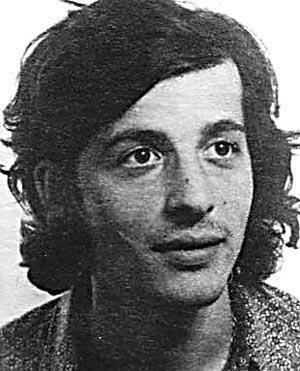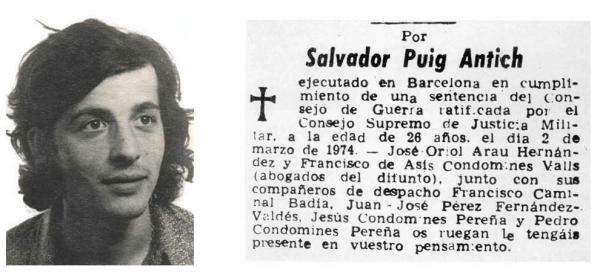Biography and history of Salvador Puig Antich

The death penalty in Spain it was in force until very recently, in fact, it was in 1978, through the Spanish Constitution, when this law was eliminated. Do you know who was the last person to be executed in Spain by means of the famous vile stick? In this lesson from a TEACHER we bring you the biography and history of Salvador Puig Antich, a revolutionary anarchist who worked so that the workers' struggle would take place in Spain and end the dictatorial system of Francisco Franco.
Index
- Childhood of Salvador Puig Antich
- The years of militancy
- The arrest of Salvador Puig Antich
- The death of Salvador Puig Antich
Childhood of Salvador Puig Antich.
Within the biography and history of Salvador Puig Antich, we place ourselves May 30, 1948 in Barcelona. At that time Salvador was born into a bourgeois, Catholic family, although with a progressive mentality, being the middle of six siblings.
During his years of study he passed through different Catholic schools, being expelled from two for bad behavior; in one of them, he even attacked a teacher. From the age of 16 he began to work in an office, in addition to obtaining his Baccalaureate at night and later the pre-university level.
It was at that time that he began to enter the militancy, due to his relationships with Javier Garriga y Oriol and Ignacio Sugranyes.
The years of militancy.
We will now see his early radicalization towards the anarchism. In 1968 the well-known “French May” takes place, for which a student, Enrique Ruano, died at the hands of the police. From that moment on, Salvador began to be present in a much more active way in politics, finding his first place on the platform of the Workers' Commissions of the Sant Josep Oriol Neighborhood, within the commission of students.
From that moment, and especially since 1969, he was radicalized until he reached the position of an anarchist. In that same year, he began his studies in Economic Sciences, in addition to performing his military service in Ibiza within the infirmary of the barracks. On his return to Barcelona he joined the Iberian Liberation Movement (MIL) within the armed squad.
From that moment, he began to be part of a series of bank robberies with which the anarchist cells were organizing. The problem was when the March 2, 1973, a member of the Banco Hispanoamericano de Barcelona was seriously injured. From that moment on, the police created a group to disband the gang.
Similarly, at a meeting in southern France, members of the M.I.L. demanded that both Salvador and José Luis Pons and the Sugranyes brothers ceased their illicit activities, although they refused to obey orders from anyone other than they.
The arrest of Salvador Puig Antich.
Continuing with the biography and history of Salvador Puig Antich we know that the last robbery carried out within his group was the one of the day September 15, 1973. That day, the Civil Guard arrested Oriol Solé and José Luis Pons during the robbery in the town of Bellver de Cerdaña. These, after a series of interrogations, confessed that the day September 25th they were going to meet Javier Garriga in a bar.
That day a police operation approached the bar, the Funicular, where they found Garriga and Puig Antich, the latter resisted and when he was chased to a nearby portal where a shooting. During that struggle, Deputy Inspector Francisco Anguas Barragán was killed, while Salvador was seriously injured.
After the shooting ended, he was taken to hospital and then to jail. Similarly, Garriga, who had fled while the shooting was taking place, was captured thanks to the citizens.

Image: Public Newspaper
The death of Salvador Puig Antich.
To conclude with the story of Salvador Puig Antich we must know that, after being discharged from the hospital, he was imprisoned and charged with the death of the deputy inspector. For this reason, he was tried by a court martial, which would find him guilty of the accusations, sentencing him to die under the death penalty of the moment: the vile club.
There were many internal political associations and many other external ones, among which we must appoint the Holy See and the Chancellor of Germany, Willy Brandt, who called for the annulment of the sentence. This never came and the March 2, 1974 at 9:20 a.m. In the morning he was executed in the model prison in Barcelona. His body was buried in the Montjuïc cemetery.
One of the direct consequences that occurred after his execution was the rejection by a large majority of countries and parties. The issue was stopped until 2014, at which time an attempt was made to bring part of the senior officials who signed their death sentence to trial.

Image: Nació Digital
If you want to read more articles similar to Biography and history of Salvador Puig Antich, we recommend that you enter our category of Story.

